No, but each brand and stage are guaranteed to be free of corn syrup, toxic chemicals, and GMOs.
Different Levels of Organic Certification in Europe
By: Suzanne Renee' - March 18, 2024 - 18 Minute Read
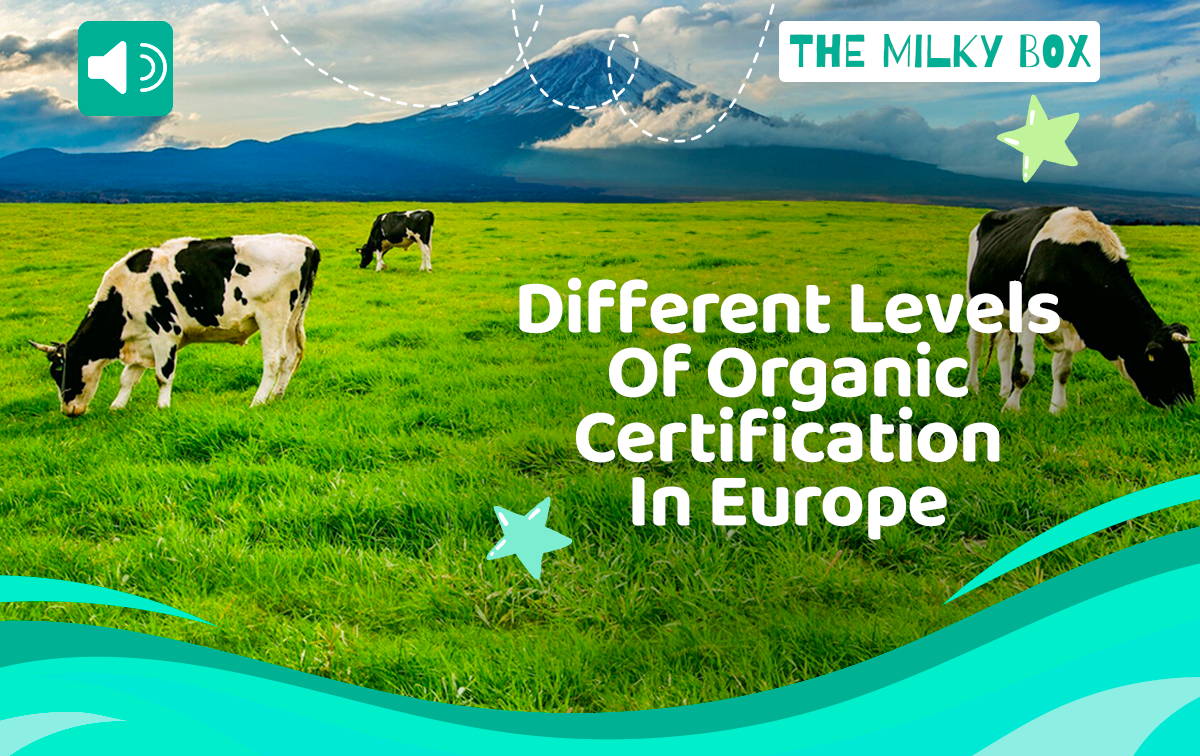
As parents, we all want what's best for our little ones, and choosing an organic formula is a beautiful option for many reasons. Not only do organic products offer a range of health benefits, but they also help to promote a healthier environment by supporting organic farming practices.
Each stage is meticulously monitored throughout production to ensure quality and control. This means you can be confident in giving your little one the best. The good news is that various types of European organic certification are available, so you can find one that suits your needs.
In this article, we will take a closer look at the production process of organic products in Europe and discuss the different types of organic certifications available throughout the region.
Specifically, we will explore the various kinds of accreditation provided by the European Union, which serves as the primary regulatory body, and the private organic certification authorities operating across Europe.
What Does European Organic Certification Mean?
At its most basic, Organic is a term used to label food or agricultural products produced according to the EU’s organic standards.
These standards involve cultural, biological, and mechanical practices promoting ecological balance, conserving biodiversity, and fostering resource cycling. In organic production, synthetic fertilizers, sewage sludge, irradiation, and genetic engineering are prohibited.
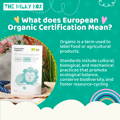
What is EU Organic?
European organic farming regulations provide a clear structure for producing organic goods across the EU. These regulations have been developed with stakeholders, experts, and the public to ensure excellent organic certification standards. The EU's organic action plan has resulted in increased innovation and investment in the organic farming sector, leading to a rise in market demand for organic food.
To understand European organic certification comprehensively, we must understand each type and its requirements. These certifications offer detailed guidelines for cultivating, processing, storing, shipping, and packaging organic products. By adhering to these regulations, organic products can be certified as authentic, ensuring their quality and safety.
EU Organic Certification
Let's begin with the fundamentals. The European Union Organic certification sets apart organic food from non-organic food, with stringent standards that must be followed for a product to qualify as organic. This identification can be done by looking for the EU organic logo, mandatory for all organic farming products sold and marketed as organic by the EU regulations.
To receive the EU Organic Certification, a product must contain at least 95% organic agricultural ingredients. The remaining 5% must meet strict conditions set by the EU. This is considered the minimum standard for certification, and other seals or certifications offered by private or state-specific organizations may require even higher standards.
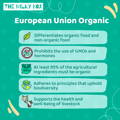
Biodiversity and Ecological Responsibility
Organic production adheres to principles that uphold biodiversity and build trust in organic products. These principles include banning the use of GMOs and hormones and restricting the use of artificial fertilizers, herbicides, pesticides, and antibiotics unless necessary.
Farmers follow specific agricultural practices to promote the health of the resources required to grow healthy crops, such as soil, plants, and animals. This involves crop rotation, avoiding using mineral nitrogen fertilizers, preventing overstocking, promoting the natural immune system of animals, and controlling pests.
Priorities Health of Livestock
There are various rules that farmers must follow to ensure the excellent health and well-being of their livestock while complying with organic principles.
To be able to label their products as organic, farmers need to provide their animals with 100% organic feed, limit the use of hormones, and ensure that they have access to open grazing areas and appropriate housing facilities.

European Organic Certification
European private certifications for organic baby formula are more stringent than the EU organic standards and are considered among the strictest regulations worldwide. Each certification has its own set of unique rules and characterizations for producing and distributing organic baby formula.
These standards include eco-farming, and in all cases, they must comply with the legal EU organic infant regulation and their own, often more stringent standards.
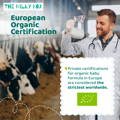
Agriculture Biologique
AB France is a certification service that has been operating since 1985. It certifies agricultural and livestock products, processed products for human consumption, and animal feeds according to strict guidelines, prioritizing sustainability through respect for biodiversity and preservation of natural resources.
The organic certification process follows an annual cycle, ensuring that organic goods are environmentally friendly and sustainably produced.
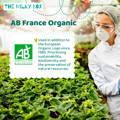
Bioland
Bioland is a well-established federation in Germany dedicated to promoting ecological cultivation. Founded in 1971, it boasts a membership of over 6,200 companies. The association is committed to creating a sustainable and socially responsible alternative to conventional agriculture.
To achieve this goal, Bioland has developed comprehensive guidelines based on the "7 principles for the agriculture of the future". The fundamental principle of these guidelines is the cycle economy, the cornerstone of organic farming.
The cycle economy ensures that the sources of nutrition are clean and sustainable, promoting the health of the environment and the individuals consuming the organic produce. Through this approach, Bioland aims to provide individuals with healthier and safer food options while promoting sustainable farming practices.
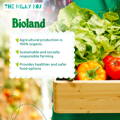
Demeter Certification
Demeter Certification is a globally recognized organization that champions biodynamic farming practices. Founded in 1928 in Germany, it derives its name from the Greek goddess of fertility and grain, Demeter.
Demeter Certification believes that a farm is a 'holistic organism.' It strongly emphasizes that all aspects of farm management, including disease prevention and insect and weed control, must be sourced from within the farm.
Demeter Biodynamic farming methods are characterized by a closed system approach that relies more on the farm's internal dynamics than external sources. This means the farm operates as a self-sustaining ecosystem requiring minimal intervention from external inputs.
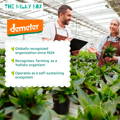
German Organic Seal
The German organic seal, was created in 2001 to help customers differentiate organic from non-organic products, is used on qualifying products in combination with the EU organic logo.
It follows all EU organic guidelines, such as ensuring that agricultural ingredients are the product of organic farming and following national organic regulations.
Products in Germany can be labeled with this seal if they meet the standards of EU organic farming, including meeting or exceeding 95% criteria for labeling their products as “organic” and using the EU organic seal.
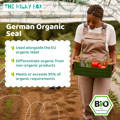
HiPP Organic Seal
HiPP is a renowned baby formula brand that has been operating in Europe for over 50 years. Their products are widely recognized for their superior quality and purity standards. HiPP holds the EU Organic logo, which is a testament to its commitment to using only organic ingredients.
Although the EU Organic logo covers several production areas, HiPP wanted to take things further by implementing even stricter guidelines to ensure the highest purity level. In particular, they wanted to address pollutants that could contaminate their produce, such as air and soil.
To achieve this goal, HiPP conducts additional quality tests to eliminate pesticide residues.
An internal seal ensures that HiPP products are made with only the purest natural ingredients.
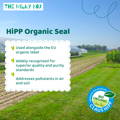
European Organic Baby Formulas
In the European market, most baby formula brands prioritize organic certification to ensure the highest quality of their products. However, some brands go above and beyond by acquiring additional certifications to maintain the highest nutritional standards.
In this context, look closely at some of the most reputable European organic formula brands. Each brand has developed unique formulas that offer distinct benefits to infants and young children. These formulas are widely known for their exceptional quality and are backed by European organic certifications.
Bébé M Vegan Organic Baby Formula
La Mandorle is a French company established in 1989. The company extensively studies dry fruits' nutrient composition and nutritional potential. With the support of the French Ministry of Research, La Mandorle has developed a patent for the invention process.
Their product, Bébé M, is based on over 40 years of experience in bio-vegetable nutrition. The company developed it with parents, healthcare professionals, and the French Ministry of Research.
Bébé M is a 100% plant-based vegan formula range. It has a unique organic rice protein hydrolysate base and is free of animal-derived ingredients. This unique nutrition is designed to address the needs of infants from birth to toddler years who have allergies to cow's milk proteins, lactose intolerance, or regurgitation.
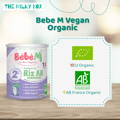
HiPP Organic Baby Formula
HiPP Formula is a leading pioneer in organic farming and infant nutrition. They are the world's largest processor of organic-biological raw materials. The HiPP legacy began in the late 19th century with Joseph HiPP, who worked in a bakery and candle shop in Pfaffenhofen.
He needed a way to feed his twins and started producing baby food in tins in the late 1950s. However, he later switched to a handier and hygienically safer jars in 1959/60. As HiPP started industrially producing baby food, cultivating fruit and vegetables on natural soil without chemicals became a standard.
Dr. Hans Müller, the founder of organic-biological farming, joined HiPP to produce healthy and tasty baby food from organic raw materials. They worked together to develop the concept of organic farming step by step. HiPP offers various options to support families, such as cow-milk-based, goat-milk-based, and sensitive formulas.
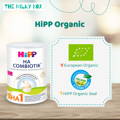
Holle Organic Baby Formula
Holle Formula, founded in Arlesheim, Switzerland, has existed for more than 85 years. From the start, Holle has been committed to taking a holistic approach to upholding its corporate responsibility towards people, nature, and future generations. This commitment to sustainable company management remains Holle's top priority.
Today, Holle Formula is a global company with a presence in over 50 countries and offers a wide range of more than 90 baby and infant products. Despite its international reach, Holle remains deeply rooted in its Swiss heritage and stays true to tradition as a strong anchor. The company is also dedicated to ensuring that every generation of children has a better world in which to grow up.
Holle offers cow and goat's milk-based nutrition with the Demeter organic certification.
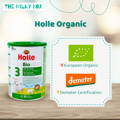
Jovie Organic Goat Formula
Jovie European formula was conceptualized in 2018 by a team of experts in the goat milk infant formula industry. A significant part of the present Jovie team used to work for Kabrita, a Dutch brand of baby formulas that successfully introduced goat milk formula.
After leaving Kabrita, the Jovie team started their own company to create the next level of goat milk-based baby formulas. Jovie was the first Dutch company to develop goat milk-based infant formula.
Jovie is committed to providing infants and toddlers with pure, organic, and whole cream goat milk packed with all the essential vitamins and minerals they need.
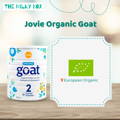
Kendamil Organic Baby Formula
Kendamil is a UK-based infant formula developed with over 58 years of expertise in infant nutrition. Located in the heart of the English Lake District, a UNESCO World Heritage Site, Kendamil is a family-owned business committed to providing traceable and sustainable food from farm to formula.
Kendamil is dedicated to innovating with a single purpose - to provide the best nutrition for your little one. Its scientists have devoted their lives to studying early life nutrition and developing the most uncompromising, nutritionally advanced formulations as close to breast milk.
Each can of Kendamil formula is designed, formulated, and hand-crafted in-house. Kendamil works with 220 local organic farms to source the highest quality ingredients. This collaboration enables Kendamil to include an unprecedentedly high level of natural mammal fats and whole-cow, whole-goat milk, and classic variations.
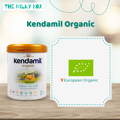
Lebenswert Organic Baby Formula
Lebenswert is a company with close ties with Holle, a renowned provider of organic baby formula that has been in operation for over 85 years. Holle is widely known for its uncompromising adherence to the highest quality standards across the globe.
In 2009, Holle established Lebenswert Organic Nutrition, which fully adheres to Bio Land guidelines, advocates for sustainability, and promotes respect for farmers, animals, and employees.
Lebenswert’s formulas are made with gentle, organic ingredients carefully selected to cater to the nutritional needs of babies from birth to toddlerhood. Thus, you can rest assured that your baby is getting the best.
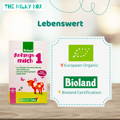
Löwenzahn Organic Baby Formula
Löwenzahn Organics is a German company that offers families modern and passionate baby formula solutions. The team behind Löwenzahn Organics comprises parents who created the company based on their personal experiences and desires for their children.
The company emphasizes transparency in its production processes and the ingredients it uses. Löwenzahn Organics is explicitly designed for babies, considering current nutritional science, and produced under strict European environmental guidelines. Their commitment to safety, transparency, and the environment makes them a top choice for families prioritizing high-quality, organic ingredients and sustainable production methods.
Löwenzahn Organics uses innovative scientific research to develop a line of Bio-organic formulas tailored to meet babies' needs, starting with gut health.
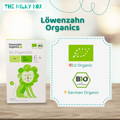
Prémibio Organic Baby Formula
Prémibio is a French brand dedicated to being at the forefront of organic farming. It only offers products produced through organic agriculture and makes ethical and sustainable investments in its partners, suppliers, customers, and employees.
Each variation and stage of Prémibio is carefully balanced to meet the dietary needs of infants, including the right amounts of fats, proteins, vitamins, and carbohydrates.
Prémibio is the first infant nutritional brand to offer organic anti-reflux and organic growth milk that can be quickly diluted even when cold. Since 2006, Prémibio has been a true pioneer in providing a range of infant foods guaranteed free from palm oil.
Prémibio offers vegan infant milk and cow and goat milk options to cater to all families.
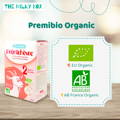
EU vs. US Organic: A Brief Overview
Let's outline some critical differences in organic standards between Europe and The United States. While both regions have their own established regulations, there are some key distinctions between them.
In Europe, organic farming follows strict guidelines set by the European Union (EU). These guidelines dictate the use of natural fertilizers and pesticides and the prohibition of genetically modified organisms (GMOs). European organic products are labeled as "bio" or "ecological" and are regulated by the EU's Organic Food and Farming Regulation.
On the other hand, the US has its own set of organic standards overseen by the US Department of Agriculture (USDA). The USDA defines organic farming as a practice involving natural substances and excluding synthetic fertilizers, pesticides, and GMOs. Organic products in the US are labeled as "organic" and are regulated by the USDA's National Organic Program.
Certification
In the EU, the organic market is overseen by the European Commission, with individual member states designating control bodies for inspections. The USDA's National Organic Program (NOP) manages it in the US.
GMOs
In the EU, GMOs are strictly prohibited in organic farming. The NOP also prohibits GMOs from organic food in the US.
Antibiotics and Hormones in Organic Foods
In the EU, antibiotics are only allowed for animal health, and hormones for growth promotion are strictly prohibited. In the US, no antibiotics are allowed in organic food, while hormones are prohibited for poultry and pigs.
Pesticides in Organic Products
Organic products in the EU are restricted to specific naturally derived pesticides. The NOP provides an allowed and prohibited list of substances for organic agriculture in the US.
Animal Welfare in Organic Agriculture
Organic agriculture in the EU has species-specific regulations that emphasize natural behavior, outdoor access, and general welfare. In the US, livestock must have outdoor access, but with less prescriptive welfare standards.
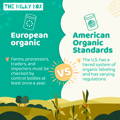
European Organic Certification
The European Union's strategy prioritizes animal health and the sustainable use of natural resources in organic farming. This approach directly impacts the quality of ingredients used in infant formula. The emphasis on adhering to the highest standards in the organic production process ensures that your little ones receive the best in European organic baby formula.
At The Milky Box, we strive to keep you informed and up to date on these standards so that you can rest assured that you provide your little ones with only the best in infant nutrition.
Frequently Asked Questions
Are all European Baby Formulas Organic?
What Is Organic Baby Formula?
Organic baby formula is defined as a formula manufactured with at least 95% ingredients that adhere to organic standards.
Why Should Parents Choose European Organic Formulas?
European baby formulas are excellent for clean, nutritious, organic nutrition, supporting healthy growth and development.
Disclaimer:
Please be aware that this information is based on general trends in babies, and it is not medical advice. Your doctor should be your first source of information and advice when considering any changes to your child’s formula and when choosing your child’s formula. Always consult your pediatrician before making any decisions about your child’s diet or if you notice any changes in your child.
Breastfeeding is the best nutrition for your baby because breast milk provides your child with all the essential nutrients they need for growth and development. Please consult your pediatrician if your child requires supplemental feeding.

Suzanne Renee' is an accomplished professional with extensive expertise in the area of infant nutrition, dedicated to promoting the health and wellbeing of children. She started this journey as a foster parent. Suzanne has emerged as a strong proponent of the European baby formula and has become a full time writer of the subject. In her free time, she enjoys camping, hiking and going to church.
Read Next:
Reviewed by Dr. Nazeli Gevorgyan, MD

Dr. Nazeli Gevorgyan is a medical doctor from Armenia and is a researcher in the fields of Obstetrics and Gynecology, among others.
Dr. Nazeli is passionate with providing women and parents with reliable and high-quality information on healthy options for infant nutrition, breastfeeding, infant formula, and food.
In her free time, she enjoys swimming, traveling, and pottery.

